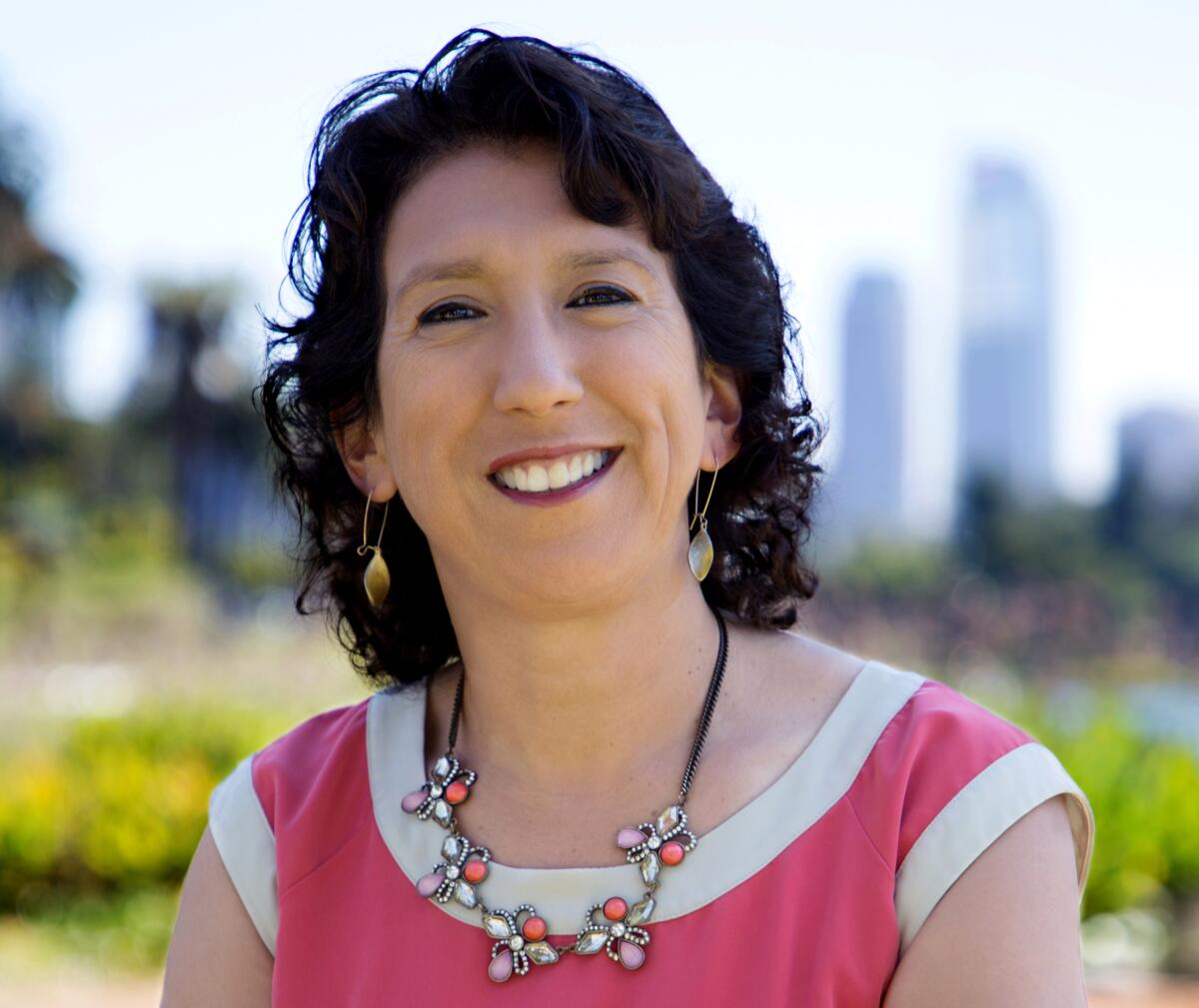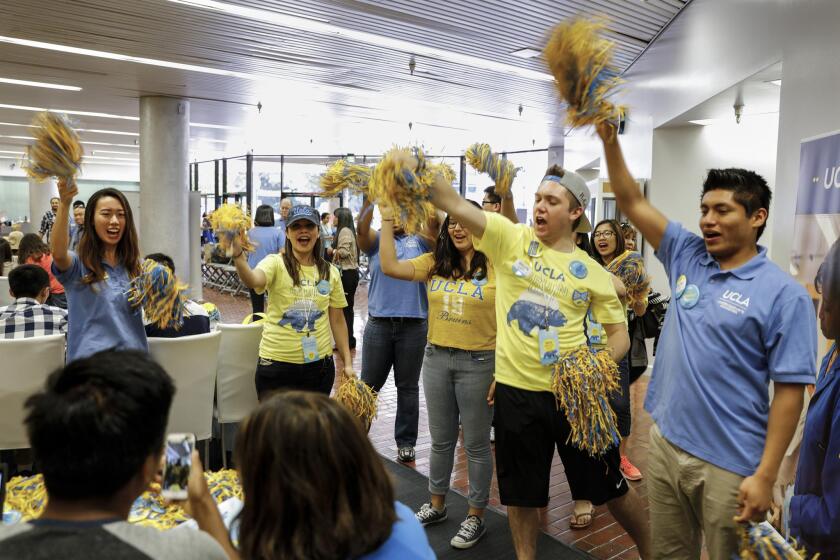‘The need is now.’ Cecilia V. Estolano, new UC regents chair, calls for expanding enrollment

Cecilia V. Estolano knows firsthand the value of a University of California degree.
The new UC Board of Regents chair grew up in the working-class aerospace community of Hawthorne, where there were few Mexican American families like hers. As a child, she saw her stay-at-home mother return to school, earn a UCLA degree and become a community college Spanish teacher. Estolano herself received a master’s degree in urban planning from UCLA and a law degree from UC Berkeley after graduating from Harvard University in social studies.
She runs two firms, Estolano Advisors and Better World Group, which specialize in land use and environmental law, urban planning, sustainable economic development and workforce development. Estolano is well known in political, civic and public policy circles with a long resume that includes heading L.A.’s Community Redevelopment Agency, working in the Environmental Protection Agency during the Clinton administration and serving on the California Coastal Commission and California Community Colleges Board of Governors.
A space crunch is projected to intensify in coming years just as the need for highly skilled workers in California grows.
As she takes the helm of UC’s governing body this month, Estolano says a top priority will be to expand access to the vaunted public research university system. She’s not yet sure how high enrollment should rise, but she knows when she wants to get started: Now.
“I don’t want to study this for three years,” she said in an interview. “We don’t have the time. The need is now.”
This conversation has been lightly edited for length and clarity.
One of your top priorities is expanding enrollment. Why?
The value of a UC education has never been greater before than now. In the last 20 years, the value of having that undergraduate education is almost like the bare minimum requirements for many good-paying jobs. And it’s not just the [bachelor’s programs]. We also need to look at the graduate programs, which are absolutely world-class. Certainly seeing that in the midst of a pandemic ... there was no flagging in the interest in our campuses. Record numbers of applications. The talent is there in the state of California. We just need to create the space for that talent to flower. The future of the state, as well as the future of the nation, really depends on UC expanding its capacity to educate the great leaders, philosophers, scientists, climate researchers of the future.
What will it take?
It’s complex and it’s expensive. You can’t do it on the cheap. It’s not just about admitting more students. It’s not just about mass production. This is about achieving the excellence for which UC is renowned. And that means world-class faculty, outstanding graduate students, and really superior staff, as well as the supports necessary to help students get through their programs in a healthy way ... mental health support, counseling. What I’d like to see us do this year ... is a plan to expand, to have a very thoughtful, comprehensive analysis of where we need to be, what are ways we can accomplish that efficiently without compromising excellence. I underscore the excellence part.
What ideas do you want to explore to achieve this?
We can use our resources better. For example, reducing time to degree creates more capacity. Using our summer sessions more effectively creates capacity. We can also talk about using our facilities more efficiently. Maybe we can also make use of facilities in the community. We can also look at lessons learned from online and remote experiences during the pandemic — both positive and negative.... We have more faculty interested in figuring out how to use remote instruction. If it provided sufficient supports, we could see more classes migrate to some hybrid or remote approach. It worked for a lot of our students, particularly those who are working and have family obligations.
We might also look at sharing resources with our sister segments, like the Cal States and the community colleges, if we’re trying to reach remote locations where there may not be a UC campus or where there may be limited physical facilities. I think there’s also a possibility to work with partners in the [private sector]. Imagine something like an educational hub where students can go to a facility, can get access to coursework and to professors.
The point is to have everything on the table and have a very all-of-the-above approach that’s tailored for each region of the state, that’s tailored for the strengths of each UC campus. But we really need to seek to make a UC education accessible to everyone in every part of the state who has the drive, ambition and wherewithal to achieve.
How much should UC expand enrollment?
I don’t know what the right number is. We’re admitting pretty good numbers. I mean, record numbers. Part of it is where are folks being admitted? You can admit, but if it’s not somebody’s first choice, they may prefer to do another option. Also let’s take a look at transfers as well. We have to take a look at what are the schools that are sending students. Is it just these top five schools, or do we want to really expand that to all the far reaches of California? Do we want to take a look at folks having preferential access near their home campus?
It has to be realistic. It has to be honest. It has to say, OK, if we want to maintain excellence, here’s how much additional faculty we’ll need and here’s the lead time to hire them.... And let’s not forget staff. Staff really keeps the enterprise running. The tremendous growth that we’ve accomplished over the last decade or so has come at the expense of appropriate staff levels, faculty levels, graduate student levels and facilities. So it’s complicated.
Should UC lobby for more funding?
I think that is part of the conversation we need to have. We need to educate ourselves on what it’s going to take, and then educate our allies, our friends in the Legislature, work with the governor’s office. I think we would all like to see our capacity expand. And the great news is we have very resourceful and creative chancellors that are all trying to get at this question. If we pull all of those ideas together, we may be able to have a comprehensive plan to expand that makes sense to the Legislature, to the governor and to the people in California.
What’s your timeline?
I want to get started on it right away.
More to Read
Sign up for Essential California
The most important California stories and recommendations in your inbox every morning.
You may occasionally receive promotional content from the Los Angeles Times.











